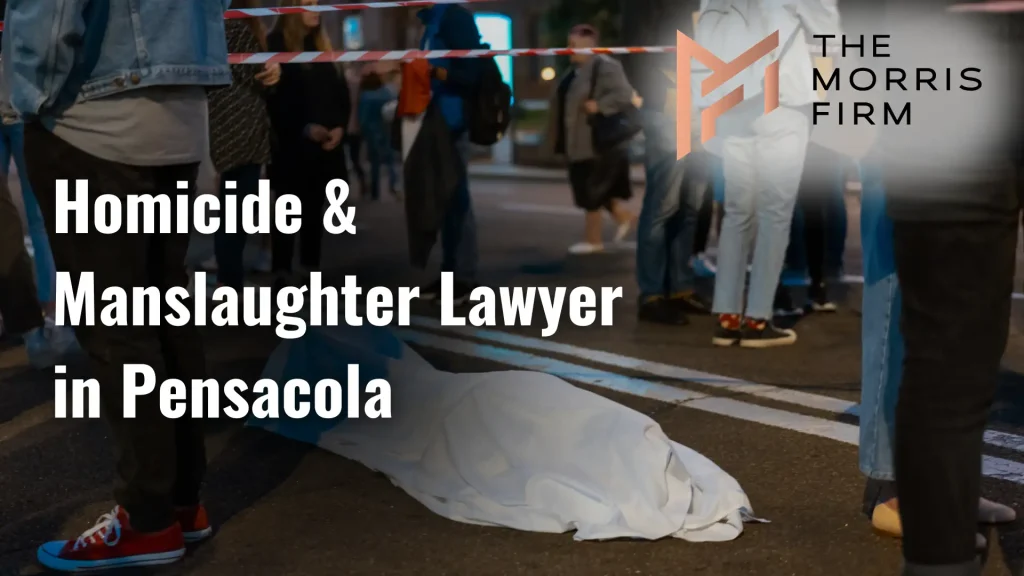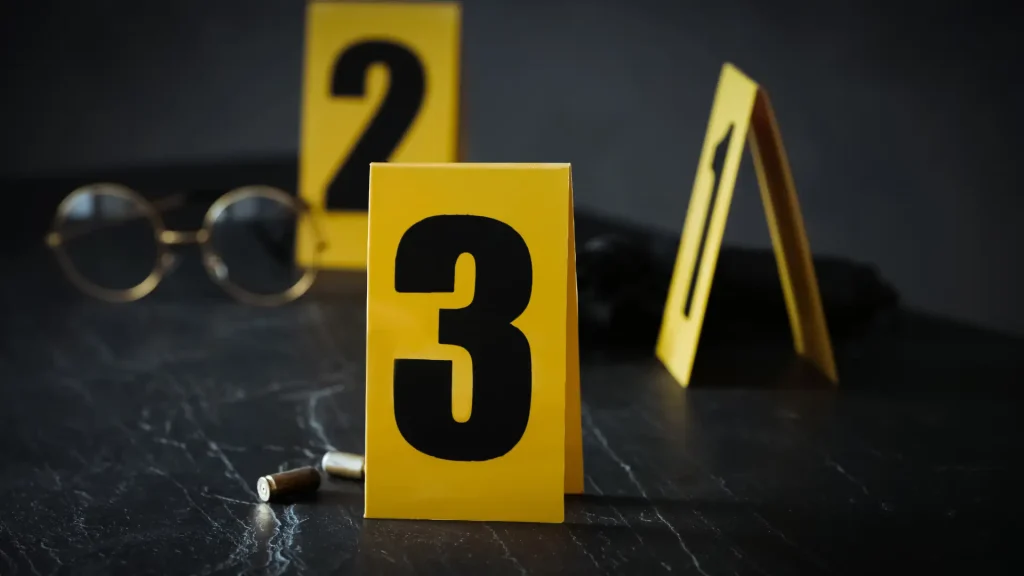
Homicide & Manslaughter Lawyer in Pensacola
If you are facing homicide or manslaughter charges in Pensacola, your freedom, reputation, and future are at risk. These are some of the most serious charges you can face in Florida, with penalties that may include decades in prison, overwhelming fines, and a permanent criminal record. The legal system is not forgiving, and you need someone in your corner who won’t back down.
At The Morris Firm, we deliver aggressive, strategic defense with personalized support every step of the way. Do not wait. Call (850) 503-2626 or visit our contact page to schedule your confidential consultation with a Pensacola violent crimes defense attorney today.
Understanding Homicide and Manslaughter in Florida
Homicide is the unlawful killing of another person, but not all homicide cases are treated equally under Florida law. The specific charge you face—and the penalties that come with it—depend on the circumstances, including your intent and how the act occurred.
Florida law recognizes two main types of homicide charges: murder and manslaughter. Each has different legal definitions, elements the prosecution must prove, and sentencing guidelines. Understanding the difference between murder and manslaughter is essential when building a strong defense and protecting your rights in a serious criminal case.
Degrees of Homicide
- First-Degree Murder involves a premeditated killing or a death that occurs during the commission of certain serious felonies, such as robbery or sexual assault.
- Second-Degree Murder does not require proof of premeditation. Still, it involves actions that show a depraved mind and utter disregard for human life.
- Third-Degree Murder applies when someone unintentionally kills another person during the commission of a non-violent felony.
Manslaughter Charges
- Voluntary Manslaughter involves an intentional killing that occurs without premeditation, often during a sudden fight or in the heat of passion.
- Involuntary Manslaughter refers to an unintentional death caused by reckless or negligent behavior, frequently tied to criminal negligence.
- Vehicular Homicide occurs when a person operates a vehicle recklessly, causing someone’s death. Under Florida law, if the driver flees the scene, the penalties increase significantly, potentially leading to up to 30 years in prison.
Understanding these distinctions allows a homicide and manslaughter lawyer to tailor your defense to the specific charges against you and potentially have those charges reduced or dismissed.
What the Prosecution Must Prove
In any homicide case, the prosecution must prove certain elements beyond a reasonable doubt. Specifically, they must show that:
- A person was killed.
- The defendant caused the death.
- The killing was unlawful, not justified or excused.
- The defendant had the required criminal intent.
Intent is what separates murder from manslaughter. First-degree murder requires premeditation, while involuntary manslaughter may only require negligence. A skilled homicide defense attorney will thoroughly analyze the evidence, question the prosecution’s narrative, and work to cast doubt on any claims about your intent or state of mind.
Common Defenses to Murder and Manslaughter Charges
No two homicide cases are alike, and the defense strategy shouldn’t be either. At The Morris Firm, we closely examine the facts and build a defense based on the specifics of your case. Common strategies include:
- Self-Defense or Defense of Others: Under Florida’s Stand Your Ground law, deadly force may be justified if you believed you or someone else faced an immediate threat.
- Justifiable Homicide: A killing may be lawful if it was done to stop a forcible felony in progress.
- Accident: If the death occurred unintentionally and without criminal negligence, it may not qualify as a crime.
- Alibi: Proving you were elsewhere during the incident can create reasonable doubt.
- Insanity: If you were legally insane at the time of the homicide, you may not be held criminally liable under Florida law.
- Lack of Intent: Without the required mental state, charges like murder may be reduced or dismissed.
These defenses often hinge on carefully analyzing forensic reports, eyewitness credibility, and law enforcement conduct. We partner with investigators, expert witnesses, and forensic specialists to build a defense that gives you the strongest chance at protecting your freedom.
The Role of Forensic Evidence and Crime Scene Analysis
In homicide cases, forensic evidence often plays a pivotal role in the outcome. As your homicide lawyer, we know how to analyze, interpret, and challenge critical pieces of evidence such as:
- DNA and Biological Evidence: This may link you to—or exclude you from—the crime scene.
- Fingerprints and Ballistics: These are used to connect you to weapons or objects involved.
- Toxicology Reports: Can reveal whether substances like drugs or alcohol were a factor.
- Crime Scene Investigation (CSI) Methods: Evidence collection or handling mistakes can distort the truth.
Expert witness testimony is frequently central to these cases. We do not just question the state’s experts—we present qualified professionals of our own to expose weaknesses in the prosecution’s claims and protect your defense.
The Criminal Trial Process in a Homicide Case
Being charged with homicide is a solemn and emotionally overwhelming experience. Knowing what lies ahead can help you feel more prepared and empowered. While every case is unique, the general process includes the following stages:
- Arrest and Charges: Law enforcement takes you into custody, and the prosecutor formally files charges.
- First Appearance and Bail Hearing: You will be informed of the charges against you and may be released on bail.
- Pretrial Motions: Your defense attorney may challenge the evidence, request a case dismissal, or file motions to suppress certain information.
- Discovery: Both sides exchange relevant evidence, such as police reports, forensic results, and witness lists.
- Plea Negotiation Strategies: If the evidence against you is strong, your attorney may negotiate a plea deal to reduce penalties.
- Trial: If no agreement is reached, the case proceeds to trial, where both sides present arguments and evidence before a judge or jury.
- Verdict and Sentencing: If convicted, a separate hearing determines your sentence. We aim to avoid this stage altogether—or fight for the lightest sentence possible.
- Appeals Process for Homicide Convictions: If errors occurred at trial, we may pursue an appeal on your behalf.
Every stage counts. Having an experienced defense team from day one can shape the direction and outcome of your case.
Penalties and Sentencing for Murder and Manslaughter
Florida imposes some of the harshest penalties in the country for homicide-related convictions. The sentence you face depends on the exact charge:
- First-Degree Murder: Considered the most serious homicide charge in Florida and may result in life imprisonment or, in extreme cases, the death penalty.
- Second-Degree Murder: A felony offense that can lead to decades or even life in prison, depending on the facts of the case.
- Third-Degree Murder: Often involves unintentional death during a non-violent felony and carries serious criminal consequences.
- Manslaughter: Whether voluntary or involuntary, this charge can bring lengthy prison time.
- Vehicular Homicide: Penalties are significantly enhanced if the driver leaves the scene.
Sentencing follows Florida’s guidelines but also depends on aggravating and mitigating factors. Prior convictions, weapon use, or a young victim can increase penalties, while no criminal history or signs of remorse may help to reduce them.
Knowing the difference between murder and manslaughter sentencing helps shape your defense strategy—and could impact whether you seek a plea deal or go to trial.
What to Do If You Are Under Investigation
 If you believe you are under investigation for homicide or manslaughter—even if no arrest has been made—call The Morris Firm right away. Do not speak to law enforcement without legal counsel. Early intervention can:
If you believe you are under investigation for homicide or manslaughter—even if no arrest has been made—call The Morris Firm right away. Do not speak to law enforcement without legal counsel. Early intervention can:
- Protect you from self-incrimination
- Block unlawful searches or seizures
- Expose flaws in the prosecution’s case
- Create better positioning if charges are filed
Timing is critical. The earlier you bring in a defense attorney, the more control you have over the situation, and the stronger your chances of avoiding charges or minimizing the impact.
Why You Need a Manslaughter or Homicide Defense Attorney
Homicide and manslaughter cases demand deep legal knowledge, strategic thinking, and aggressive advocacy. At The Morris Firm, we provide all that, plus the local insight and personal commitment that set us apart.
We know the Pensacola court system inside and out. Our attorneys have handled bench and jury trials and successfully defended clients facing complex felony and homicide charges. We understand how to dissect flawed evidence, challenge the prosecution’s assumptions, and negotiate for reduced charges, acquittals, or complete dismissals when possible.
Every decision is guided by one goal: protecting your rights and giving you the strongest possible defense. Whether you have been falsely accused or made a tragic mistake, we are here to help. As your manslaughter attorney or homicide defense attorney, we fight for your freedom because the outcome of your case can shape the rest of your life.
Speak with a Pensacola Murder and Manslaughter Lawyer Today
Murder and manslaughter charges are among the most serious offenses under Florida law. You cannot afford to face them alone. Let The Morris Firm provide the strong, personalized defense you need. We will be in your corner from day one, fighting to protect your rights and your future.
Call (850) 503-2626 today or complete our contact form to schedule your free consultation. Throughout the site, you can also explore how we handle violent crime cases.
Your future matters. Let us help you fight for it.
